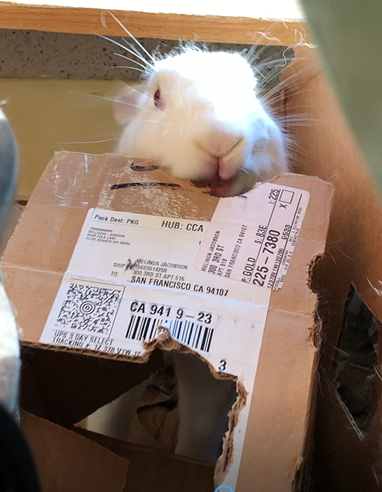
Since the onset of COVID-19, I’ve had lots more things delivered. I’ve converted the ensuing logjam of shipping boxes into bunny toys, and even whole rabbit recreation areas. But amid the pandemic, there’s been social media warnings claiming companies are spraying their packages with antibacterials that are toxic to our furry friends. Is it true?
Flunking the Smell Test
Let’s stroll through the logic. Why would companies go through the extra step (and expense) of spraying their delivery boxes?
Suppose they’re trying to protect their pack-and-ship employees from catching bugs from the boxes. Wouldn’t having them wear gloves be an easier solution? It’d be quicker and cheaper than spraying something all over the outside of every box.
So, if not for their workers, would it be for their customers’ benefit? Maybe they want to put their patrons at ease and prevent the potential scandal of being a source of disease spread. If that were the case, surely they’d advertise to gain competitive advantage for their trouble: “Buy from us and receive only bug-free boxes!” But I haven’t seen any company touting such germ-proofing.
And finally, the CDC has said that surface contact is not a significant factor in the spread of COVID-19. Once this guidance became known, any extraordinary measures to disinfect shipping boxes, if they ever existed, would surely have been discontinued to reduce cost.
So Why the Warnings?
To me, the most plausible explanation is pandemic-related anxiety. We all keep a vigilant watch to protect our vulnerable fur-babies from harm and view every object they encounter with suspicion — most especially things that they might ingest.
With COVID looming outside our doors, the packages coming through them became subjects of our wariness. Most likely the antibacterial boxes are a phantom of some loving pet owner’s protective imagination that got shared and transformed over time into a widely disseminated fallacy. It certainly wouldn’t be the first (or last) time misinformation got propagated by the Internet.
Rather than accepting these claims at face value, I did some Googling to see if there was a legitimate origin for them. Nothing. What I did find was a Snopes.com article that debunked a similar social media post accusing Amazon of using pesticide sprays . I tucked the antibacterial posts into my “alternative facts” file and considered the matter settled.
Ethical Dilemma
Then I received a response to one of my blog posts — an article recommending using cardboard boxes to make rabbit toys . The commenter cautioned me about those antibacterial dangers.
My immediate response was to suppress the comment since it was an unverified claim. Maybe I can’t stop all misinformation from spreading on the Web, but I can make sure my own blog doesn’t add to it.
I felt bad about it though. The person who wrote it had good intentions. She might think I just didn’t want anyone to disagree with me.
Plus, she mentioned that her whisker-nose had a tendency to eat so much cardboard he’d get bloat. It’s true that not all rabbits should chew on the stuff. For example, our sweet Pixel had terrible loose stool that I eventually traced to cardboard consumption. Eliminating her access to the stuff solved the problem.
But to abandon shipping boxes entirely based on unverified reports of potential harm is problematic. Using them for rabbit toys provides great opportunities for enrichment while keeping costs down. This is essential for the well-being of a lot of house rabbits whose owners can’t afford to buy toys. Erring on the side of caution therefore also has a cost in depriving those buns of recreation they need daily.
Putting It To the Test
After stewing over this, it struck me that I didn’t need to rely on my gut. I could ask the companies directly.
So I found a list of the top ten U.S. online retailers. I eliminated sites like eBay and Etsy where merchandise is shipped direct from small sellers — I think we can all agree that mom-and-pop shops and individuals are not implementing antibacterial spray protocols. That left the following list:
- Amazon
- Walmart
- Target
- Best Buy
- Macy’s
- Home Depot
I contacted each of them and asked what they do. For example:
Hello Amazon PR!
I am the author of The Bunbrary Blog, a weekly internet publication for families with pet rabbits. You may not know, but often bunny owners will use cardboard to make low-cost toys for their furry companions.
There are rumors circulating in social media that, since the pandemic, it is no longer safe to use shipping boxes for this purpose because “companies are spraying them with antibacterials now and they are harmful to animals”.
Can you comment?
Though only two of them responded, the result was crystal clear.
“No, we don’t spray our boxes by any means.”
— Amazon
“Target does not treat boxes before shipping to customers.”
— Target

Can They Be Trusted?
Should one should put blind faith in the word of Corporate America? No. But, again, I don’t see how they’d benefit from:
- spraying their boxes with antibacterials
- lying about it when directly asked.
The former seems like a cost with little or no benefit. The latter incurs a huge liability if my rabbit dies after chewing on a logo-marked shipping box and I discover it’s infused with toxic antibacterials. It would be so much easier to just admit they spray them and advise me to steer my bunnies clear.
I’m satisfied I can put this matter to rest as a well-intentioned but misinformed rumor.
The Fluffy Tail of This Blog Post
Every bun is unique. Some may have specific sensitivities that make it unsafe to use cardboard as bunproofing or enrichment in their environment. But as for the social media claim that shipping boxes are contaminated by antibacterial treatments, I’m not buying it!